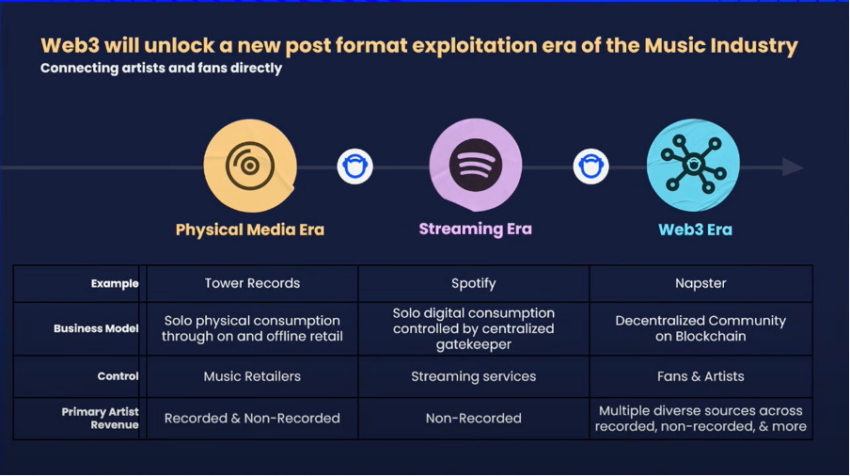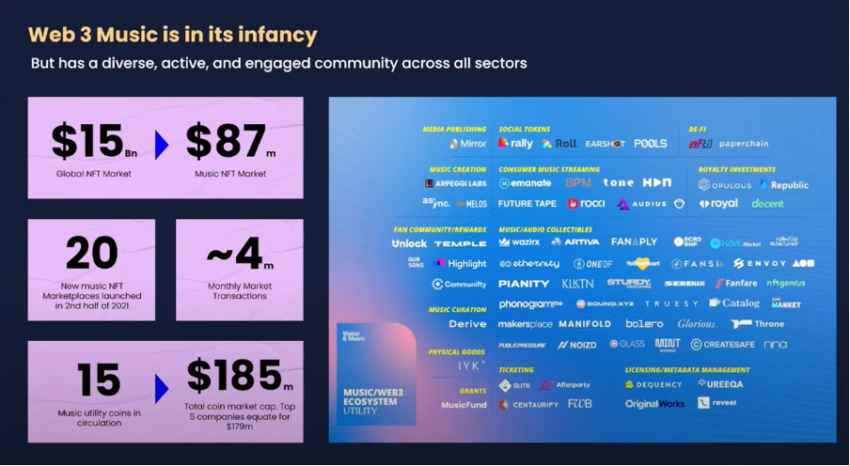There has been a shift in the music industry as it begins to intersect and weave itself into the growing web3 sector. But will this evolution be able to appease artists, labels, and consumers?
Irrespective of the industry, its widely agreed that artists and those creating content should be the ones that profit the most from the consumption of that content. In actuality, however, the biggest pieces of the pie are eaten up by the platforms that host this content.
The music industry is one of the most egregious examples of this. Which is why many music artists are now trying to take back control with the integration of blockchain and decentralization. These are the primary cornerstones of the web3 movement.
The topic of how much a music artist should be paid for their work is quite contentious and opinions vary wildly. Many reports and surveys have been conducted to try and shed more light on this. For example, a 2018 study based in the U.S. found that on average, musicians raked in just 12% of the total amount made from streaming. Meanwhile, a U.K.-based poll by The Ivors Academy and Musicians’ Union found that 80% of music creators earned less than £200 per year from streaming.
Surprisingly, even major streaming services like Spotify aren’t making any profits. But with the advent of web3, music artists have new avenues and tools to monetize their hard work.
Different Eras of the Music Industry
In the pre and early 2000s, the music industry was largely still based on physical media. CDs and DVDs ruled the market. But soon after, companies like Napster (which got itself in hot water due to piracy issues) unlocked the digital age and modified its business model to allow a way for artist to get paid for downloads of their music.
Shortly after this, with the permeation of smart phones into everyone’s daily lives, streaming services became the new trend. And while streaming is an extremely convenient and quick way to share one’s music to the world, the services themselves were taking the lion’s share of the money, paying artists just ~$0.004 per stream.

The web3 movement is making strides in promoting decentralization. And this could be the perfect time for to innovate and create a new economy that empowers fans and artists. Blockchain seems to be a perfect fit to facilitate this type of system.
Web3 also enables faster payouts, solves payor fragmentation, and opens revenue streams to all levels of artists.
Why Should Artists Care About Web3?
Musician 3LAU made more than $11 million in a single day after selling his first-ever NFT album in 2021while Don Diablo sold a concert NFT for $1.2 million within the same year.
Smaller artists, too, have made significant revenue by releasing their songs on platforms like Sound.xyz.
One of the leading music companies, Warner Music Group, collaborated with Polygon last year to create a web3 music platform. Partnerships like these have pushed the sector closer to mainstream adoption.
Another web3 platform, Hume, founded by former Universal, Sony, Nike, and Warner Music executives, acquired Blocktones, a large-scale NFT music platform. It is primarily used for publishing and acquiring full-length instrumentals in the form of NFTs. The holders of these NFTs then possess the IP associated with the tracks.
This will help to create new pathways for artists and creators to develop open-sourced music.
Web3 Music Still in the Early Stages
Despite the innovations made in the indsutry, web3 music companies are lagging behind in funding. For instance, similar sectors like web3 gaming grew to $4 billion in market cap in 2021 while the music NFT market is only valued at around ~$87 million.

Jon Vlassopulos, the CEO of Napster, told BeInCrypto:
“All the artists are supportive; the labels are supportive of the web3 industry has been very welcoming to Napster as we’ve come in with our new investors. The timing is correct, the technology is there, and all the constituent stakeholders are ready to support this innovation. However, I think in the last couple of years, the web3 music industry has been in its Infancy,”
Overall, to reach critical adoption levels, the industry needs successful collaborations and funding. All the while, regulators are keeping close tabs on the rise of web3.
 beincrypto.com
beincrypto.com